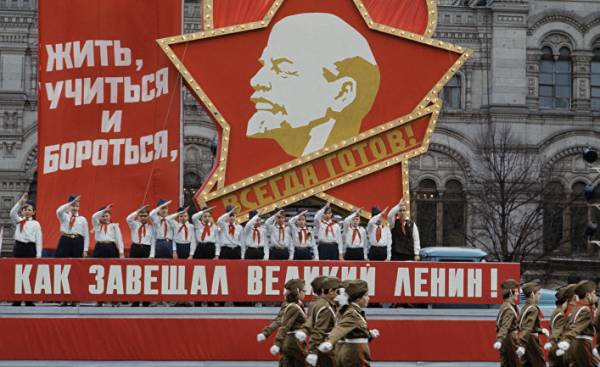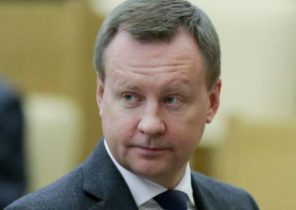
The day before yesterday I had guests from Moscow, and the conversation naturally turned to about what today says the whole of the Russian capital: on the large-scale renovation project, which aims to demolish all five-storey apartment buildings, constructed in the period of mass construction in the late 1950s and early 1960s. But the problem is that almost all these houses have long been demolished. This project is the demolition of five-storey buildings of the 1950s and 1960s, years of construction will destroy four – and seven-storey modernist building, erected in the early 20th century. In fact, it is planned to demolish all that stands in the land which can be re-built. This is not a five-storey block houses 1950-ies and 1960-ies, but they are still made in this category. This is a language problem.
Russian poet Sergei. once said that at the end of the Soviet period, he is literally crazy range of products from the hardware store. For example, he loved the word shears. Well, it’s garden shears. Pruner — a great word. He’s got form. He has weight. He had a purpose. It is by far. This is not a hammer, do not rake and plough. It’s not even a scissors. In a world where words are constantly used in the opposite sense, the ability to call pruner shears, and nothing else, was true freedom.
On the other hand, freedom, as we know, is slavery. So said Orwell in “1984”. The same was said in the USSR, where they were “laws”, “Constitution” and even “elections”, also known as “the free will of citizens.” Elections were required and suggested that you come to the so-called polling station, receive a pre-filled ballot paper (one name), and then drop it in the ballot box, standing in the middle of the hall. It was this “free will of the citizens”. It wasn’t free, and it was not the will of the citizens, for no their will they did not Express. When this ritual called “elections” or “the free will of citizens”, it had a double effect: the words “elections,” “free” “will” and “citizens” lost their meaning, and the process remained undocumented. And when something is impossible to describe, it is something can not become a fact of collective reality. Hundreds of millions of Soviet citizens were doing something that cannot be described. But I would say that they did not feel it because they didn’t have appropriate words to describe their experience. At the same time, the experience can be accurately described with such words as “election” and “free” pre-discredited, because these words meant something completely different.
As a young journalist, I worked in the country of his birth in their native language. In the early 1990s, the Russian journalists rediscovered journalism, which are used primarily for purposes directly opposite to the transmission of truthful and reliable information. There were language problems. Language politics, language values and even the language of feelings was robbed and emasculated. People for decades have portrayed the revolutionary passion, and they are tired of the idea of passion. Therefore, the new Russian journalists made a choice in favor of the language that was descriptive in the most literal sense. We tried to use verbs and nouns, and only with respect to those things which it was possible to observe directly. It was a journalistic equivalent of a hardware store: if a word form could not be accurately described, and the weight of words it was impossible to measure, to use it we could not. Such a language is good when you describe what you have before your eyes, but it’s awful when you have to convey the state of mind and heart. This much we restrict.
Writing in Russian is a challenging and dangerous occupation, is akin to walking through a minefield. One wrong step can ruin the whole undertaking. Compared to this, writing in English was a genuine freedom. But then the situation in Russia began to deteriorate. The new government came and caused new damage to the language. Vladimir Putin has proclaimed “dictatorship of law”. His main ideology was to promote the idea of “managed democracy”. Interim President Dmitry Medvedev said, “Freedom is better than unfreedom”. Now word has not had a directly opposite meaning. They just didn’t mean anything. The phrase “dictatorship of law” was so stupid that the words “dictatorship” and “the law” has become meaningless.
Donald trump has an innate ability to force the language of the two ways. He is particularly skilled in taking words and phrases related to power, and turns them upside the head. That’s the way he used the phrase “safe space”, when talking about visiting elected Vice-President Mike Pence of the musical “Hamilton.” As you know, a Penny there booed, but then the artists she spoke to him passionately and respectfully. Trump said on Twitter that this wasn’t supposed to happen. So he fashioned the phrase “safe space” in order to be called a safe place where people usually do not feel safe and feel powerless. Stating that second degree of influence and power man in the world should have a “safe space” in public, trump has turned this notion on its head.
The same focus trump has done with the phrase “witch hunt”, saying that it’s the Democrats, trying to avenge the defeat in the elections. But the losers, both large and small, usually can not conduct a witch hunt because witch hunter must have the strength and power. And of course, he just usurped and perverted the term “fake news”.
But trump has a special flair for using words in such a way that they don’t mean anything. Everything about him is gorgeous, and everything is fine. Any word can be inserted or removed. First NATO “legacy” and then “no longer stale”. This violates not only our understanding of the word “obsolete”, but our common idea of linear time.
And trump knows how to take it, and then pile them up, which is devoid of any meaning and significance. Here is one of many excerpts taken from his interview with the Associated Press on the first 100 days of the presidency:
First, there is the greatest responsibility. For example, when it came time to run the 59 Tomahawk missiles in Syria. I say to myself: “you Know, it’s more than just seventy-nine (SIC) missiles. It is also death, because he could kill people. It’s a risk, because if the rocket will fly, and then explode in the city, near civilian populations — you know, these boats were hundreds of miles from the target — if the rocket falls in the center of the city or village… to make such decisions much more difficult than usual. [inaudible]… This is life and death, and more…. Therefore, there is much more responsibility [inaudible]… the Financial cost of all, they are very large, at each Department. The United States, they are thousands of times more than the largest company in the world.
Here is a partial list of the words in this passage has lost its meaning: “responsibility”, the figures “59” and “79”, “death”, “people”, “risk”, “city”, “civic”, “hamlet”, “decision”, “hard”, “usually”, “life”, “United States”. Even the word “inaudible”, which put journalists here means nothing, for how could it be something “unintelligible” during the interview face to face? The role of the journalist, too, has lost its fundamental meaning: the interviewer is forced to participate, to suspend unintelligible monologue additional questions, or words like “right”, but it creates the false impression that something in the words of trump actually true or might be correct, although in reality it simultaneously says everything and says nothing. And it can’t be true.
Verbal clutter trump filled with statics public space. It’s as if instead of air we began to breathe carbon monoxide. It is deadly. It poisons the environment of our collective reality. After all, why do we need the language: to be able to say “secateurs”, buy it and use it. So the surgeon could say the word “scalpel” in the belief that the scrub nurse will put the tool in his hand. A mother can understand the story of his returning from the school child to the judge to evaluate the arguments of the defense and the prosecution. But all this is not possible when words mean nothing.
We, the authors, from the end of the 20th century often spend time on doubts about the ability of words to reflect the facts, and the existence of objective facts themselves. There are people who with glee or shame see some connection between this post-modernist exercise and post-true, post-linguistic habits trump. It seems to me that this is a fundamental misunderstanding, or maybe a voluntary Union of its intentions. When writers and scientists doubt the limitations of language, these doubts invariably motivated by the desire to shed more light on the public sphere, to realize collective reality today is more nuanced than yesterday. The desire to focus more on shape, weight and destination of the thing, which can have the name or find the names of those things which in the past was not observed. In this case, we are very dependent on a common language. Wrote Hannah Arendt (Hannah Arendt):
We from experience know that no one can independently and alone to adequately grasp the objective world in all its full reality, because the world always shows itself to man only on one side, which corresponds to its position in the world and is determined by them. If someone wants to see and experience the world the way it is “in reality”, then he can do it, but understanding it as something that many people agree that lies between them, separates and links them, that different is presented to different people and it becomes clear only to the extent that people can talk about it, to share with each other opinions and points of view, comparing them with each other. Only in the freedom of our fellowship with each other world of which we speak, emerges in all its objectivity and comprehensive visibility.
“Only in the freedom of our fellowship with one another”. To maintain this freedom, we must be the custodians and guardians of our language. We need to do so that he lived and worked. This means that words should be used cautiously. That is, the lie must be called a lie. I’m telling you, people with National public radio (National Public Radio), where, among other things, was born the expression “untrue statement”. National public radio cites the argument that the definition of the word “lie” implies intent (a lie is a statement made to deceive) — no comprehensive information about the intentions trump. But the problem is that the euphemism “untrue statement” it has a clear additional value is the absence of intent. That is, like trump just accidentally made a wrong move. But the words exist in time: the expression “untrue statement” suggests that this is an isolated case, and thereby frees trump from liability for the numerous lies. With regard to Trump the expression “untrue statement” means a lie — since the existence of neutral words is a lie.
When words are used to lying, it destroys language. When words are used to conceal lies, even discreet and unobtrusive, it also destroys language. When the unintelligible chatter we respond with polite words, we approve it and it also destroys the language. It’s not just a question of prestige of the author or the objectivity of journalism. We are talking about the survival of the public sphere.
In Russia, first took the words about politics, about values and about passion. Then took words of action, words that describe buildings, numbers that represent dates. And then I don’t have any words to say. It is not only a Russian phenomenon. Here is what he said about Confucius:
If the language is incorrect, then what is said is not what you have in mind. If what they say is not what you have in mind, then what you need to do remains undone. If it is not done, it undermines morality, destroys the art. If justice goes astray, people stop in helpless confusion. So that said, there should not be arbitrariness. That is more important.
The time will come (and I fear it will not come soon), and we have to think about how to rectify the damage caused by the current era of American politics. My concern is that after some time, we, individually or collectively, abandon certain words, because they have completely lost their meaning. For example, I may well abandon the word “magnificent”. But we must do so that after the tramp we came in new era with other words that have not lost its meaning: “law”, “freedom”, “truth”, “power”, “responsibility”, “life”, “death”, “fifty nine”, “President”, “presidential”, “unprecedented”, “false”, “fact”, “war”, “peace”, “democracy”, “justice”, “love”, “secateurs”.







